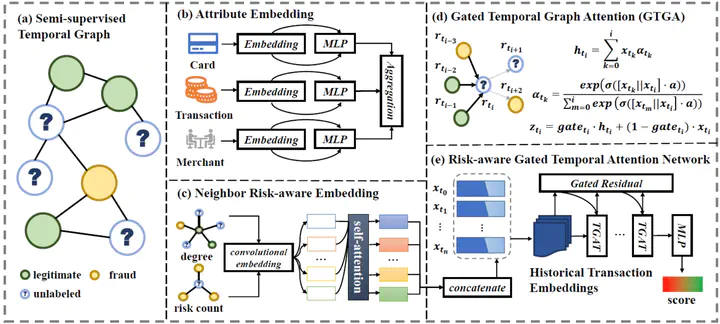 Image credit: IEEE
Image credit: IEEEAbstract
Credit card fraud is a severe issue that causes significant losses for both cardholders and issuing banks. Existing methods utilize machine learning-based classifiers to identify fraudulent transactions from labeled transaction records. However, labeled data are often scarce compared to the billions of real transactions due to the high cost of annotation, which means that previous methods do not fully utilize the rich features of unlabeled data. What’s more, contemporary methods succumb to a fallacy of unawareness of the local risk structure and the inability to capture certain risk patterns. Therefore, we propose the Risk-aware Gated Temporal Attention Network (RGTAN) for fraud detection in this work. Specifically, we first build a temporal transaction graph based on the transaction records, which consists of temporal transactions (nodes) and their interactions (edges). Then we leverage a Gated Temporal Graph Attention (GTGA) Mechanism to propagate messages among the nodes and learn adaptive representations of transactions. We also model the fraud patterns through risk propagation, taking advantage of the relations among transactions. More importantly, we devise a neighbor risk-aware representation learning layer to enhance our method’s perception of multi-hop risk structures. We conduct extensive experiments on a real-world credit card transaction dataset and two public fraud detection datasets. The results show that our proposed method, RGTAN, outperforms other state-of-the-art methods on three fraud detection datasets. The risk-aware semi-supervised experiments also demonstrate the excellent performance of our model with only a small fraction of manually labeled data. Moreover, RGTAN has been deployed in a world-leading credit card issuer for credit card fraud detection, and the case study results show the effectiveness of our method in uncovering real-world fraud patterns.